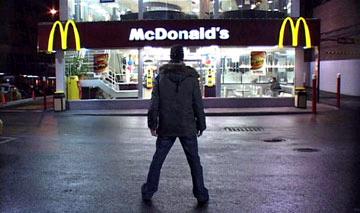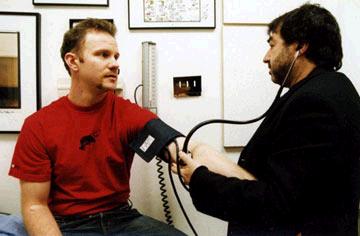Super Size Me


Take note Michael Moore - Super Size Me is the correct way to make a documentary that takes a strong stance. Morgan Spurlock, who wrote and directed this documentary, knows how to present reams of factual information while entertaining the viewer. Super Size Me is very funny, yet scary at the same time. Spurlock was the toast of the 2004 Sundance Film Festival, where the film won the Director's Award and was nominated for the Grand Jury Prize. And shortly after its debut there, McDonald's announced that it was doing away with its "Super Size" option. They claimed it was not because of the documentary, but because of other, more nebulous reasons. On Monday, April 19, McDonald's CEO Jim Cantalupo died of an apparent heart attack at a convention of franchise owners. Two days later, Den Fujita, the man who brought McDonald's to Japan, died of heart failure. These two deaths are unfortunate and are unrelated to the documentary, but only add fire to Spurlock's claims about the food at McDonald's.
Super Size Me took form when two overweight children sued McDonald's, claiming that the corporation made them obese. Spurlock decided that he would eat nothing but McDonald's for one month. The rules were simple. He had to eat everything on the menu (including water), eat each meal there, and if he was offered to super-size, he had to accept. He had three doctors and a nutritionist monitoring his health, along with his aghast girlfriend, who, believe it or not was a vegan chef. What makes Super Size Me a good documentary is that Spurlock did his homework. He present facts on obesity, the eating habits of America, and the ubiquitousness of McDonald's and other fast food restaurants. People used to eat home cooked meals every night. Now, people eat out much more often, and the food they eat is not the healthiest. It all makes for a pretty compelling case that fast food is a major cause of obesity in America (duh).
The big surprise was the diet's effect on Spurlock. In a short amount of time, he gained a lot of weight. His mood changed visibly, and one of his doctors remarked that his reactions to his meals were like an addiction. His sex life suffered, and worst of all, his cholesterol shot up and his did some pretty bad damage to his liver. This went beyond what anybody thought would happen. One definite factor in this was Spurlock's decision to get as much exercise as the average American, which is almost none. The one weakness in his experiment was the amount of food he was eating. It was never explicitly stated, but he sure looked like he was wolfing down more than what a normal person would eat. Still, the bulk of his argument seems sound, and Spurlock presents it in an engaging, lively way. Not many people knew that a McDonald's salad had more fat than a Big Mac. Now they do. Sure, this is probably one big publicity stunt for Spurlock, whose career is certainly on the fast track, but unlike Moore, he comes across as genuine, not as a publicity hound.